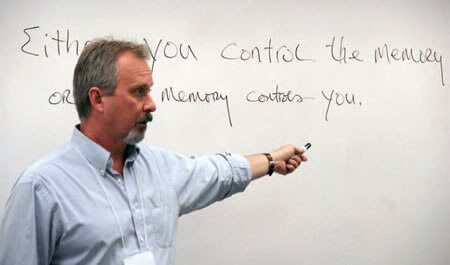Every veteran has a story but sometimes, they just don’t know how to tell it.
Veteran’s Writing Project (VWP) founder Ron Capps believes that all a veteran needs is a little help to get the words on the page. He knows this from his 25 years serving in both the active Army and Army Reserve. After deploying to five different war zones over the course of a decade, Capps’ battlefield experiences left their mark. He was medically evacuated from Darfur following a suicide attempt, and that’s when Capps realized he needed a change.
“I was on my fifth war in 10 years. I hadn’t taken care of myself. What I figured out was, that I had these memories stuck on a replay loop and they were in control of me,” Capps recalled.
Conventional therapy wasn’t working for him, so Capps looked for another way to get control of his memories. He wrote a note to himself that said, “Either you control the memory, or it controls you” – and posted it to a wall next to his desk. Then, he set out to write down the looped memories that wouldn’t get out of his head.
After successive writing sessions, Capps realized what he needed was a way to tell his story. So he went to Johns Hopkins, where he earned a master’s in creative writing. Then, in 2011, he founded the Veteran’s Writing Project. Now, he serves as the director and curriculum developer for VWP.
VWP provides no-cost creative writing seminars and songwriting workshops for veterans, active duty service members, and adult family members of those in the military. VWP also publishes a quarterly literary review of writing, O-Dark-Thirty, which helps participants put their stories in front of readers.
Workshops offered through VWP
Creative writing seminars take place across the county alongside a range of programming from general creative writing workshops to advanced craft workshops, focusing on both fiction and nonfiction, as well as poetry, playwriting, and songwriting.
VWP works in partnership with several organizations, including National Endowment of the Arts and Wounded Warrior Project to local libraries, universities, and individuals to help spread awareness of its mission. To date, more than 3,600 veterans and family members have worked through VWP programming and workshops.
Mentor connections
VWP also facilitates mentoring relationships between service members and professional writers. Army Reserve Lt. Col. Leo Karanikolas is a current mentee with VWP as he works on his nonfiction memoir. Karanikolas said he was looking for a medium to tell his story.
“As a veteran, our stories are unique even if we don’t think so. I like the idea of putting my story on paper to both understand and digest my traumatic event and for others to learn from. I didn’t expect it would be so therapeutic, but it has been incredibly helpful. Veterans all across the country need to find a medium to share their thoughts since we’ve been at war for so long,” he said.
Karanikolas said the experience has been amazing so far.
“Everyone has a unique way to process their experiences and for me, the writing process helped so much. I love how my mentor is understanding and gently pushes me forward. There are times where writing my story is difficult and her experience and understanding has been important in putting those thoughts and words on paper,” he said.
Service members looking for a mentor or professional writers looking for a way to give back to the military community can contact Jake Agatucci, program director. Agatucci is an Army veteran who teaches composition and writing at a college in Oregon. Find out more about the mentoring program online at https://veteranswriting.org/mentors.
VWP’s recognition of women veterans
Jerri Bell is a retired naval officer who heads up Washington, DC-based programming, focusing on women veteran issues. She is also the managing editor of O Dark Thirty.
After retiring from the Navy, Bell was looking for a new way to carve out an identity. She recounts that some of her active–duty experiences were painful, and she needed to move on. One night, she stumbled on an article highlighting what fellow Johns Hopkins graduate, Ron Capps, was attempting to do in starting VWP. She met with him a few weeks later and was offered the job as the managing editor of O Dark Thirty.
Bell is an advocate of the benefits of writing, both for veterans and their family members.
“Every one of the instructors at the Veterans Writing Project has personally experienced the beneficial effects of writing. I’ve published about experiences that I never thought I’d share with anyone but a few close friends, and it has brought me great satisfaction and relief,” Bell said.
Read: Program for service women transitions to virtual training
Bell says her standout moments as a workshop facilitator are in groups that she runs for women veterans only. Since women are still a minority in the military, their experiences differ widely from male veterans.
“When women in our groups start to share their stories, there are often gasps of, “I thought I was the only one!” You can see the bonds forming, the community building itself as the stories are shared,” said Bell.
VWP aims to go to places where programming doesn’t exist for veterans. Instead, it focuses on underserved areas and has worked with veterans in 26 states, serving more than 3,600 veterans and family members.
Connect with VWP on social media on Facebook or Twitter.
Editor’s note: Jessica Evans serves as a mentor with VWP.

